

Bloom’s Activity Analysis Tool. I have been working on a simple method of analysing teaching and learning technologies against Bloom’s Digital Taxonomy. I have taken the verbs associated with each of the taxonomic levels and arranged them across a sheets and then added a column for the activity components.
The idea is that you take your activity and break it down into the component elements and match these against the different taxonomic levels and the learning actions. Learning From Students. Small comments from students can cause large shifts in my understanding of learners, curriculum, and classroom dynamics.
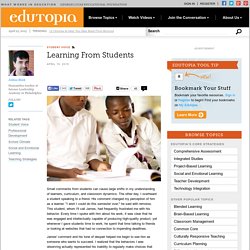
The other day, I overheard a student speaking to a friend. His comment changed my perception of him as a learner. 4 Tips to Transform Your Learning Space. The 8 Minutes That Matter Most. I am an English teacher, so my ears perk up when writers talk about their process.
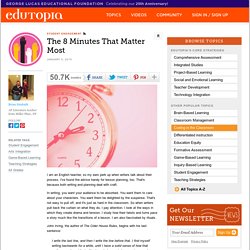
I've found the advice handy for lesson planning, too. 19 Ridiculously Simple DIYs Every Elementary School Teacher Should Know. How Student Centered Is Your Classroom? In the education world, the term student-centered classroom is one we hear a lot.
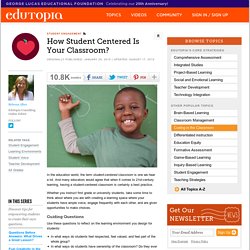
And many educators would agree that when it comes to 21st-century learning, having a student-centered classroom is certainly a best practice. Whether you instruct first grade or university students, take some time to think about where you are with creating a learning space where your students have ample voice, engage frequently with each other, and are given opportunities to make choices. Guiding Questions. Teaching kids to be ‘digital citizens’ (not just ‘digital natives’) - The Answer Sheet. This was written by John Merrow, veteran education reporter for PBS, NPR, and dozens of national publications.

He is the president of the nonprofit media production company Learning Matters. Merrow’s latest book is “The Influence of Teachers.” This post first appeared on Merrow’s blog, Taking Note. By John Merrow. Should Teachers Grade Homework? There are quite a few different views about whether or not homework should be graded.
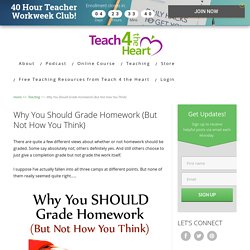
Some say absolutely not; others definitely yes. Questioning Authority: Evaluating Wikipedia Articles. Jim Wilson/The New York TimesSue Gardner, executive director of the Wikimedia Foundation, with an assistant, James Owen.Go to related article » Overview | If Wikipedia is a collaborative project open to all, why are fewer than 15 percent of the site’s contributors women?
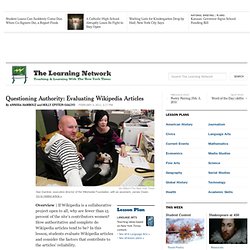
How authoritative and complete do Wikipedia articles tend to be? In this lesson, students evaluate Wikipedia articles and consider the factors that contribute to the articles’ reliability. Materials | Copies of the Fill-In: Wikpedia and Gender (optional), student journals, computers with Internet access. How to Turn Your School Into a Maker Haven. Exploratorium/Flickr One of the best ways for frustrated parents, students and teachers to convince school leaders that it’s time for a reboot is with amazing student work.
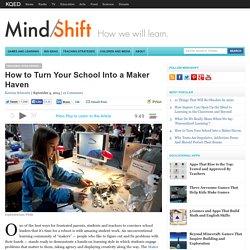
An unconventional learning community of “makers” — people who like to figure out and fix problems with their hands — stands ready to demonstrate a hands-on learning style in which students engage problems that matter to them, taking agency and displaying creativity along the way. 20 Questions To Guide Inquiry-Based Learning. 20 Questions To Guide Inquiry-Based Learning Recently we took at look at the phases of inquiry-based learning through a framework, and even apps that were conducive to inquiry-based learning on the iPad.
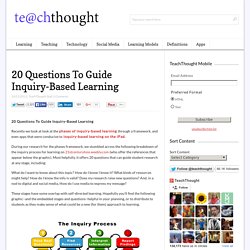
During our research for the phases framework, we stumbled across the following breakdown of the inquiry process for learning on 21stcenturyhsie.weebly.com (who offer the references that appear below the graphic). Most helpfully, it offers 20 questions that can guide student research at any stage, including: The Inside-Out School: A 21st Century Learning Model. The Inside-Out School: A 21st Century Learning Model by Terry Heick As a follow-up to our 9 Characteristics of 21st Century Learning we developed in 2009, we have developed an updated framework, The Inside-Out Learning Model.
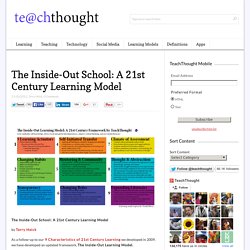
The goal of the model is simple enough–not pure academic proficiency, but instead authentic self-knowledge, diverse local and global interdependence, adaptive critical thinking, and adaptive media literacy. By design this model emphasizes the role of play, diverse digital and physical media, and a designed interdependence between communities and schools. Creating Classrooms We Need: 8 Ways Into Inquiry Learning.
Confuse Students to Help Them Learn - Teaching. By Steve Kolowich If you had to pick a single word to explain how Derek Muller ended up in a Perth hotel room arguing with an empty chair, it probably would be "confusion.
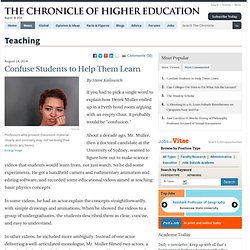
" 10 Shifts in Thought & Action Made by High-Impact Teachers. The more I visit classrooms around the country and observe different types of teachers, the more I notice a series of shifts. In fact, when I interview well-regarded teachers who appear to have consistently positive results with students, I hear them describing a rather consistent list of shifts in their habits and thinking throughout their teaching career. Here is what I hear. 1. From teaching groups of students to teaching individual students in a group. The first leaves the teacher picking some middle ground and teaching all students the same way at the same time. 2. 3.